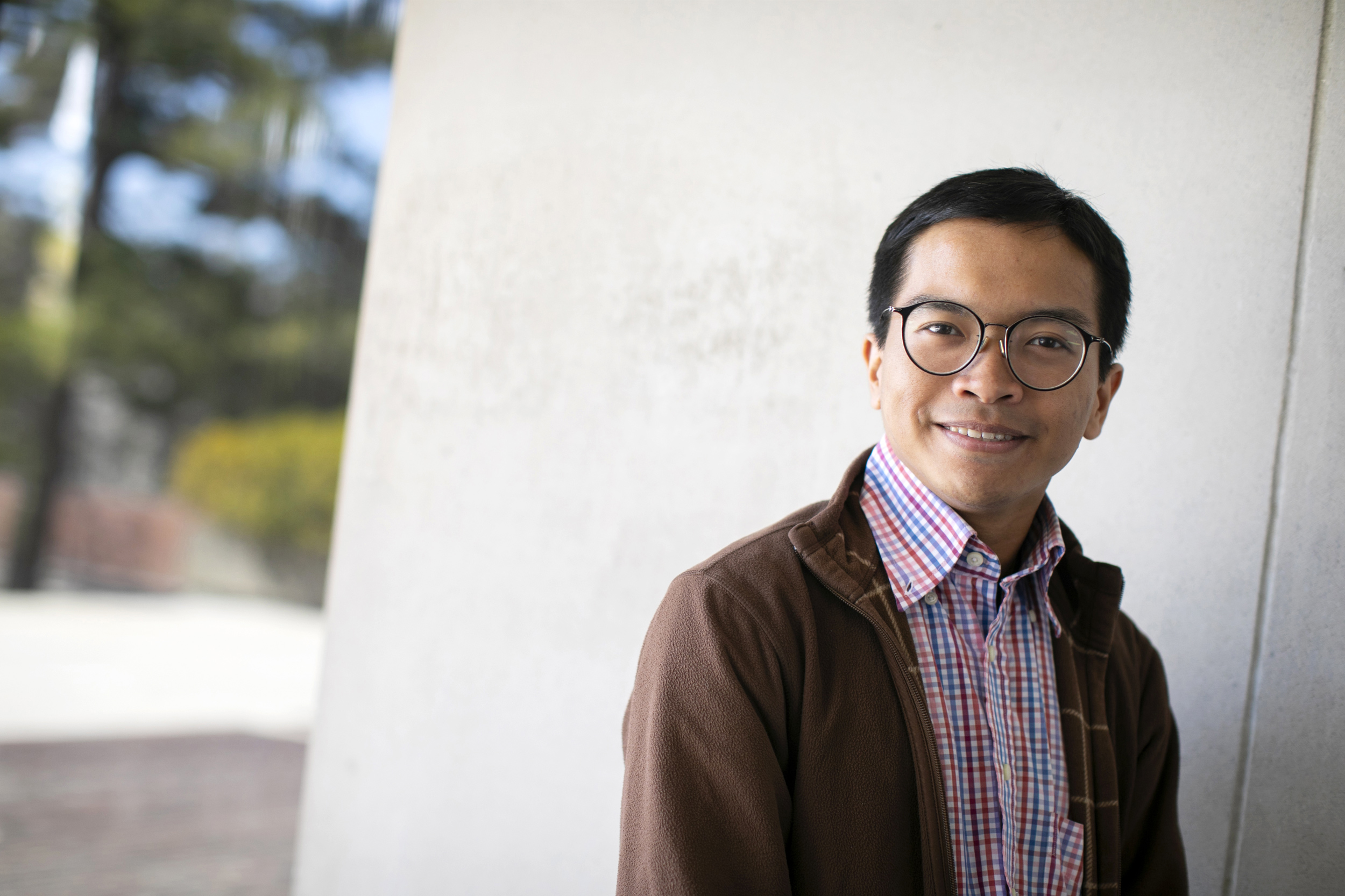
After graduation, Jeromel Dela Rosa Lara will intern with the International Organization for Migration before heading to Oxford University in the fall.
Stephanie Mitchell/Harvard Staff Photographer
As teen, he was embarrassed by his migrant worker mom’s job
But now Jeromel Dela Rosa Lara understands plight of millions like her around world, and wants to help
This story is part of a series of graduate profiles ahead of Commencement ceremonies.
Jeromel Dela Rosa Lara speaks softly but with energy, eager to talk about his senior thesis. The son of a migrant worker from the Philippines, Lara chose to focus on an issue close to home.
“My thesis looks into how for Filipino migrant domestic workers in the Middle East, ritual practices and the formation of group gatherings through the church are ways for the community to reclaim their agency, their identities, and to a greater extent, to reclaim the labor of care that many of them have to do,” said the senior joint concentrator in social anthropology and comparative study of religion.
Lara was born in the Philippines, a nation plagued by high poverty rates. An estimated 10 percent of the population works overseas, including several members of his family. His grandfather first petitioned for his mother to immigrate to the U.S. in 1990. After more than a decade, approval came, and Lara, who was then 11, and his mother moved to the U.S., where she worked as a certified nursing assistant despite having earned a nursing degree in the Philippines.
He recalled that his single mother’s job embarrassed him as a teen and that he was “ashamed” to tell classmates and friends. It wasn’t until high school that Lara’s attitude shifted after he was exposed to books and stories about the complexities of the lives of more ordinary individuals who didn’t have “lofty” occupations in medicine, law, or business.
“This made me realize how much I was in the wrong. How treating my mother with this shame, I was a bad son,” he said. “Now, I’ve been trying to change, to do the best that I can to value the narratives and stories that my mother has.”
The Cabot House resident ultimately found inspiration in her story, which he began to share. In April, he was a guest speaker in “Religious Dimensions in Human Experience: Apocalypse, Home, Medicine, Music, Sports, Sacrifice,” a class taught by his thesis adviser Davíd Carrasco, the Neil L. Rudenstine Professor for the Study of Latin America with a joint appointment with Harvard Divinity School.
Said Carrasco: “He gave this tremendous talk in class. He was dramatic. It was clear and insightful. But it also spoke to a son’s journey with his mother coming from the Philippines, adjusting, and dealing with this place. He spoke about his own disappointment with himself that he had been ashamed to say to people that his mother was a nurse’s aide and how he realized the pressures on him to have to feel that and how he overcame it.”
His mother’s struggles as a migrant worker also inspired Lara to focus his research on domestic workers like her. Lara turned his attention to Jordan because the Middle East is one of the top destinations for Filipino migrants.
During a December 2022 trip to Amman, he visited the Philippine embassy, where he learned there are more than 43,000 Filipino migrant workers in the country, of whom 76 percent are undocumented. Lara’s semester abroad in Jordan also helped him decide that he wanted to focus his thesis research on “care work,” particularly household service work done by women.
As part of his anthropological research, Lara examined Jordan’s kafala foreign-worker system, which gives sponsors tremendous legal power over migrant employees. In addition, he looked at the broader cultural context and noted ads and media in Jordan dealing with foreign workers tend to depict them as useful products instead of people. Lara concluded the system encourages the commodification or extraction of care work from communities in the Philippines, Ethiopia, Ghana, Nepal, and Bangladesh and leads to abuse and mistreatment of workers.
Lara also aimed to learn how these mostly female migrants took care of themselves and each other. To do so, Lara studied in Jordan during his junior year and integrated himself within the communities of Filipina migrant workers he was studying. Carrasco noted that Lara not only joined their devoutly Catholic religious community but also found ways for the migrant workers to share their artwork.
“His is a brilliant thesis that resulted from gaining the trust of Filipina care workers and coming to discern the enormous work burden they bear,” said Arthur Kleinman, Esther and Sidney Rabb Professor of Anthropology, professor of medical anthropology in global health and social medicine, professor of psychiatry at Harvard Medical School, and Lara’s second thesis adviser. “Jeromel is greatly sensitive to structural violence as it affects the poor and combines religious studies with ethnographic description to discover the grounds that can be better inhabited by all of us so as to improve caregiving and the lives of caregivers.”
Lara plans to continue his research and work in migration. After graduation, he is interning with the International Organization for Migration in Jordan before heading to Oxford University in the fall to pursue a master’s in migration studies.
“There’s something about him, about his issues, about his involvements. I think that he’s indefatigable and he’s unstoppable in the best ways,” Carrasco said of his student. “He’s a gift to us, a gift to Harvard, and he’s an agent of very positive change.”




